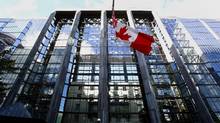The shock from the relentless slide in oil prices is spreading ever further into Canada’s economy and financial markets, with the dollar, the stock market and bond yields all descending to new lows in what was an ugly end to a volatile week.
Friday’s losses spared few markets throughout the world, as the global stock correction found fresh momentum from the commodity sell-off and new evidence of weakness in the global economy.
The major benchmarks of developed stock markets around the world fell 2 to 3 per cent. The S&P 500 index flirted with its 2015 low, racking up $1.41-trillion (U.S) in losses over the past two weeks, while the S&P/TSX composite index was dragged further into bear market territory, now down 22 per cent since the April, 2015, peak.
Canada’s distinct vulnerability to the global commodity bust is reflected not just in equity carnage, but also in the plunging value of the Canadian dollar, which sunk to below the 69-cent mark for the first time since April, 2003.
The market is now betting that the Bank of Canada will be forced to react to protect the domestic economy, which has added to the forces dragging down the loonie.
“The risks are still tilted to the downside for the Canadian dollar,” said George Davis, chief technical analyst at RBC Dominion Securities. “It’s hard to look for a lot of optimism because there is still no sign of a concrete low in oil prices.”
West Texas intermediate fell on Friday by about 5 per cent to well below the $30-a-barrel mark. The prospect of new crude supplies from Iran, which is expected to have its economic sanctions lifted soon, has added new pessimism to the vastly oversupplied global oil market.
As long as there is downside to oil prices, the loonie will be compelled to follow, Mr. Davis said. And since crude prices have already sunk below most analysts’ worst-case forecasts, a bottom for the currency is difficult to peg.
The collapse of crude prices has also gripped the Canadian dollar indirectly by raising the probability of a rate cut. The market is now pricing in about a 60-per-cent chance that Bank of Canada Governor Stephen Poloz will cut the overnight lending rate next week, which is up from just 15 per cent on Monday. Recent indicators have shown the damage from the commodity shock spreading beyond Canada’s resource sectors.
“Low commodity prices are posing tremendous challenges to an economy transformed by years of large windfall revenues,” Credit Suisse said in a note. “The negative income shock has spread to the whole economy more visibly in 2015.”
With a Canadian economic revival looking increasingly unlikely, additional monetary stimulus is needed now, Emanuella Enenajor, an economist at Merrill Lynch, wrote on Friday.
“Why should the Bank of Canada wait to see the whites of the eyes of recession before easing? By then, it may be too late,” she said.
Canadian central bankers are not alone in facing renewed pressure to loosen policy. Weak readings of the U.S. economy have raised questions about the Federal Reserve’s recent rate hike.
“Leading indicators of the manufacturing economy and industrial production are flashing a higher risk of recession,” said Stephen Lingard, senior vice-president at Franklin Templeton Investments.
“Has the Fed made a policy mistake? Is growth that much weaker than they thought?” he said. If this year continues as it has started, the Fed may have to consider reversing course.
Canadian rate action, however, is much closer to being a reality. And a cut would surely push the Canadian dollar to even lower depths.
While a soft currency is a potential salve for the kind of terms of trade shock Canada is facing, it’s possible to weaken the dollar too much and too fast, Avery Shenfeld, chief economist at CIBC World Markets, said in a note on Friday.
“Many Canadians view the exchange rate as a temperature gauge on the country’s economic well-being,” he said. “The unprecedented pace of its decline risks an even larger hit to growth by shocking household confidence.”
For markets, an ugly end to an awful week

























Laissez un commentaire Votre adresse courriel ne sera pas publiée.
Veuillez vous connecter afin de laisser un commentaire.
Aucun commentaire trouvé